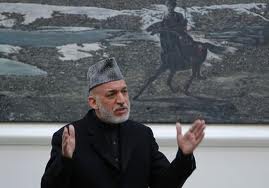West must relearn lesson of Durand Line
West must relearn lesson of Durand Line
by Salim Mansur
Toronto Sun
March 17, 2012
: .
If there is a ghost haunting Hamid Karzai, the Afghan president, it is likely that of Najibullah, the last Soviet-backed president of Afghanistan. When Soviet soldiers departed in 1989 Afghanistan disintegrated into the control of rival war lords. Najibullah held power until 1992, and when unable to exit the country he was forced to find refuge inside the besieged UN mission in Kabul.
On the evening of Sept. 27, 1996, Taliban warriors entered the UN compound and rendered their savage verdict on Najibullah. He was castrated, and his blood-soaked body dragged behind a truck through the streets of Kabul and then left to hang from a traffic light.
Karzai probably senses the beginning of the end for his regime, and the brief experiment in democracy and nation-building for Afghanistan under the UN mandate which began in January 2002. Some nine months ago his brother, Ahmed Wali Karzai, who headed the provincial council in Kandahar, was murdered by one of his security guards. If it were not for 9/11 and Osama bin Laden with his al-Qaida base in Afghanistan, there would have been no involvement of America and its western allies in that barren land-locked country at the edge of civilization.
The Soviet campaign in Afghanistan ended as badly as did the two Afghan campaigns mounted by Britain in the 19th century. Yet it can be said there are circumstances in history when winning turns out to be the worse alternative, and Afghanistan is a prime example of this paradox. After 9/11 the attention given to Afghanistan by the West meant another door was opened fortuitously for the country to leap frog from its Dark Age into at least some semblance of the 19th century it had missed entirely.
But the Afghan war lords, Taliban warriors, Islamist ideologues and their counterparts in Pakistan are deeply suspicious and fearful of the modern world. It is the same with the ayatollahs of Iran and Islamists in the Arab world.
These are people who selectively desire to acquire tools from the West while fanatically rejecting the open, free and democratic culture that has produced them. And the West in turn cannot comprehend the nature of a people willing to be suicidal in holding fast to a culture that by any measure is retrograde, even reprehensible. After the misadventure with the Afghan wars, Britain drew the Durand Line separating Afghanistan from British India. The lesson learned was simple — Afghans were best left alone tending to their seventh-century pre-occupations. Forgetting that lesson writ large across the Arab-Muslim world has been the misadventure of the West since 1945.
In retrospect, the picture of Franklin Roosevelt hosting the Bedouin tribal Emir Abdulaziz ibn Saud on board the USS Quincy in February 1945, illustrates what was destined to go wrong. In this asymmetrical relationship the West would be corrupted in its dealing with the Arab-Muslim world, and the latter turned increasingly resentful given the Islamist jihadi culture.
There is urgency in re-learning the lesson of the Durand Line. A new line of containment drawn separating the West with its culture of freedom from that of the Arab-Muslim world demanding mute submission is the strategic imperative of the present.
اجمالي القراءات
2813


